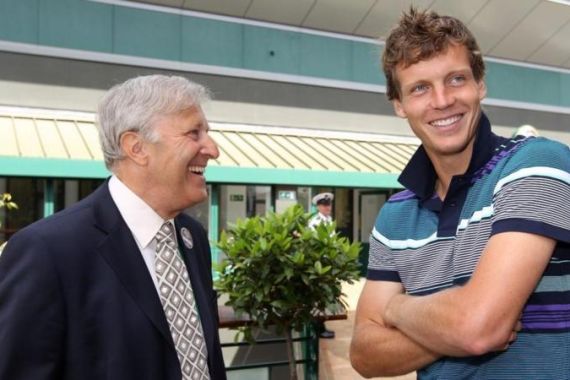Jan Kodes remembers the Davis Cup
As the Czech Republic take on Spain in the Davis Cup final, a former player looks back on his memories of tournament.

When Czechoslovakia won the Davis Cup in 1980, the players were under heavy pressure from the Communist regime, former star Jan Kodes recalls as the Czechs brace to face Spain in this year’s final this weekend.
“We were under constant pressure,” said Kodes, the 1973 Wimbledon champion, who was on the Czechoslovak team that lost the 1975 Davis Cup final but lifted the trophy five years later.
Keep reading
list of 4 itemsWTA Finals to be held in Saudi Arabia from 2024-2026
Djokovic, Ivanisevic split after 12 Grand Slam victories
‘Tragedy’: Tennis star Sabalenka heartbroken over ex-boyfriend’s death
“In the eyes of the authorities, the Davis Cup was far more important than individual trophies from tournaments, including Grand Slam events,” the 66-year-old said in an interview.
“A defeat at Roland Garros? No problem. But losing in the Davis Cup meant trouble,” smiled the 1970 and 1971 French Open champion.
|
“A defeat at Roland Garros? No problem. But losing in the Davis Cup meant trouble” Wimbledon champion Jan Kodes |
The totalitarian Communist regime in former Czechoslovakia, toppled in the bloodless Velvet Revolution of 1989, considered tennis “bourgeois” hence undesirable.
Tennis stars – including Kodes who was eastern Europe’s first Wimbledon winner – were seen as displaying all too visibly their wish for freedom and independence amid the strict rules imposed on those “representing a socialist country.”
“Trips abroad were restricted. To take part in tournaments, you had to submit the programme to the authorities in advance and ask them for permission to leave the country,” Kodes said.
“At the largest tournaments, we were systematically accompanied by a ‘comrade’ who made sure we behaved ourselves,” said Kodes.
“There were also countries that were strictly banned by the Czechoslovak authorities, including Chile, South Africa, Israel and Taiwan,” he said.
Lifting the Salad Bowl
Czechoslovakia, which split into the Czech Republic and Slovakia in 1993, lost a few star players over this policy, including Martina Navratilova and Ivan Lendl who eventually moved overseas to play unhindered.
Kodes, born in March 1946, was a member of the Czechoslovak Davis Cup team from 1966 to 1980.
In 1975, Czechoslovakia were beaten by Sweden 3-2 in the final in Stockholm as the unstoppable Bjorn Borg topped up his impressive series of twelve wins in as many Davis Cup games, both singles and doubles.
But five years later, in December 1980, Czechoslovakia finally lifted the famous Salad Bowl after beating Italy 4-1 in Prague.
Jan Kodes was part of the team but did not play, yielding to a younger pair of Ivan Lendl and Tomas Smid.
“I was 34 years old then. Ivan and Tomas were better at that time,” he said without a trace of bitterness.
As a bonus for this historic victory, each player on the team received the equivalent of $3,500 from the Czechoslovak Sports Association and a governmental committee for physical exercise and sports – a small fortune for the average Czech in the Communist era.
At present, Kodes is a member of an international committee choosing players for the International Hall of Fame, to which he himself was inducted in 1990.
At the weekend, he will be watching the 100th edition of the Davis Cup final between the Czech Republic and Spain on a hardcourt in Prague as an honorary guest invited by the International Tennis Federation.
“I think the tie will be close, there is no favourite,” he said.
“But the absence of (Rafael) Nadal has definitely boosted the chances of the Czechs who also had the right to choose the surface,” said Kodes.